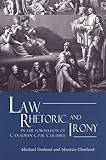Law, Rhetoric, and Irony in the Formation of Canadian Civil Culture / Michael Dorland, Maurice Charland.
Material type: TextPublisher: Toronto : University of Toronto Press, [2002]Copyright date: ©2002Description: 1 online resource (432 p.)Content type:
TextPublisher: Toronto : University of Toronto Press, [2002]Copyright date: ©2002Description: 1 online resource (432 p.)Content type: - 9780802081193
- 9781442676602
- 971
- JL186.5
- online - DeGruyter
| Item type | Current library | Call number | URL | Status | Notes | Barcode | |
|---|---|---|---|---|---|---|---|
 eBook
eBook
|
Biblioteca "Angelicum" Pont. Univ. S.Tommaso d'Aquino Nuvola online | online - DeGruyter (Browse shelf(Opens below)) | Online access | Not for loan (Accesso limitato) | Accesso per gli utenti autorizzati / Access for authorized users | (dgr)9781442676602 |
restricted access online access with authorization star
http://purl.org/coar/access_right/c_16ec
In Rhetoric, Irony, and Law in the Formation of Canadian Civil Culture, Michael Dorland and Maurice Charland examine how, over the roughly 400-year period since the encounter of First Peoples with Europeans in North America, rhetorical or discursive fields took form in politics and constitution-making, in the formation of a public sphere, and in education and language. The study looks at how these fields changed over time within the French regime, the British regime, and in Canada since 1867, and how they converged through trial and error into a Canadian civil culture. The authors establish a triangulation of fields of discourse formed by law (as a technical discourse system), rhetoric (as a public discourse system), and irony (as a means of accessing the public realm as the key pillars upon which a civil culture in Canada took form) in order to scrutinize the process of creating a civil culture. By presenting case studies ranging from the legal implications of the transition from French to English law to the continued importance of the Louis Riel case and trial, the authors provide detailed analyses of how communication practices form a common institutional culture. As scholars of communication and rhetoric, Dorland and Charland have written a challenging examination of the history of Canadian governance and the central role played by legal and other discourses in the formation of civil culture.
Mode of access: Internet via World Wide Web.
In English.
Description based on online resource; title from PDF title page (publisher's Web site, viewed 01. Nov 2023)


